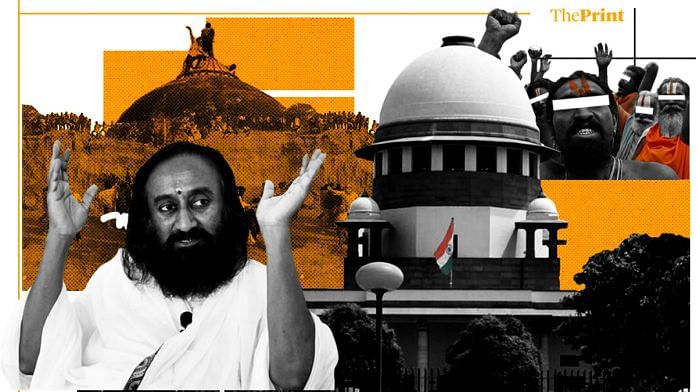The Supreme Court said Wednesday that it hoped to conclude the day-to-day hearings in the Ram Janmabhoomi-Babri Masjid land dispute case by 18 October. The five-judge bench led by CJI Ranjan Gogoi also passed an order that mediation can continue and its outcome can be placed before the Court.
ThePrint asks: Is Supreme Court being pragmatic by allowing Ayodhya mediation during legal proceedings?
Ayodhya mediation only a formality now as all parties know verdict will be announced soon

Justice A.P. Shah
Former Chief Justice of Delhi High Court
Regarding the Ayodhya matter, I have never heard of a case where legal proceedings and mediation take place simultaneously. While I am sceptical, I do hope something comes out of it. But if legal proceedings and the mediation take place simultaneously, then the mediating parties will not be serious about the process. The common legal practice is that when an alternative mechanism for dispute resolution is going on, then the hearing is usually stayed. To have the Supreme Court adjudicate the matter at the same time as the mediation process is something I am quite unsure of.
I would not say that I am pessimistic at this point, but I do not know what to make of it. Last time when the mediation committee requested for more time, the top court ought to have granted them more time. However, the Supreme Court wanted to go ahead with its hearings. The mediation process should have been given another chance, and the legal proceedings could have started later. One cannot help but notice that the legal process is scheduled to be over before Chief Justice Ranjan Gogoi retires, which could be a possible reason to expedite the hearing in the matter.
It almost seems like the mediation is now just a formality because all the parties know that the verdict will be pronounced soon, so the chances of a settlement are very slim. I doubt any of the three warring parties will be willing to settle the Ayodhya matter given that the time remaining is very less.
Also read: Ayodhya arguments likely to wrap up by 18 October, SC says mediation can continue
Supreme Court is being pragmatic by allowing mediation and hearings to continue side by side
 Ishkaran Bhandari
Ishkaran Bhandari
Advocate
I think the Supreme Court is being pragmatic by allowing the mediation in the Ayodhya matter and the legal proceedings to take place at the same time. I say this because the Ram Janmabhoomi-Babri Masjid case is, at its core, a civil dispute. And in any case of civil dispute, the first attempt is to send the matter for mediation. This is the ideal legal procedure followed by all courts.
If the conflicting factions in the civil dispute reach a middle ground, then the common practice for the courts is to first accept this decision and then go ahead with legal proceedings. I am aware that the Ayodhya dispute has moved beyond being a mere civil dispute case, and now also concerns matters of religion and fundamental rights. This is why when the mediation process failed initially, the top court started the day-to-day hearings.
The Supreme Court will conclude the hearings on 18 October, and the judgment should come by late October-early November. In the case the mediating parties arrive at a settlement, then this can be accepted. But the top court has not got done with its part of the work yet. I think it is high time that the Ayodhya dispute is resolved once and for all.
Also read: Rao to Vajpayee, Ayodhya mediation always failed. Supreme Court must not fall for it again
Supreme Court is right to allow mediation. All options should be exhausted before the final verdict comes
 Arghya Sengupta
Arghya Sengupta
Founder and Director, Vidhi Centre for Legal Policy
The Ayodhya matter is essentially a communal conflagration being fought in the guise of a property dispute. The objective of any resolution in this dispute is not only to decide who the owner of the property is, but also to prevent any outbreak of violence and heal old wounds. In order to do this, any form of mediation should be given a chance to resolve the dispute completely.
Though unusual, the Supreme Court is right to allow the mediation process to go on simultaneously with the day-to-day hearings. I say this because all options of arriving at a settlement should be exhausted before the Supreme Court announces its final decision on the Ayodhya matter.
One must also understand that the mediation process is still continuing means that the Supreme Court had initially given very limited time to the committee to settle the Ayodhya dispute, notwithstanding the extension. But it’s time to let bygones be bygones, and one should welcome the Supreme Court’s openness towards allowing the mediation process to carry on in the case.
Ayodhya court proceedings & mediation don’t work together. No one knows it better than Supreme Court
 Maneesh Chhibber
Maneesh Chhibber
Columnist
India’s highest Constitution court, the Supreme Court should know there’s no appeal beyond it. That is why every decision by the Supreme Court must be carefully thought-through, and not lead to needless delays.
It is in this context that it makes little sense for the five-judge constitutional bench to allow parties in the Ram Janmabhoomi-Babri Masjid civil dispute to continue the mediation while also simultaneously fight each other in court.
The Supreme Court bench should be aware that the Ayodhya dispute is much more than just about a small piece of land — it is a political hot potato that the politicians passed onto the Supreme Court.
The Ayodhya issue is such that the losing party is unlikely to accept the Supreme Court’s verdict. There will be reverberations. And questions over the haste shown by Chief Justice Ranjan Gogoi-led bench in pushing the warring parties to wrap up their arguments will continue long after.
So, won’t the process of mediation alongside hearings delay the settlement of this dispute? What if the mediators, somewhere in the middle of October, tell the Supreme Court they could be nearing a settlement? Will the court then put its final judgment on hold? Don’t forget that CJI Gogoi retires on 17 November, almost a month after the court’s scheduled date of 18 October to complete the case.
The best way would have been the Supreme Court alone deciding the case. Court proceedings and mediation processes seldom work in unison, and the Ayodhya case isn’t any different. Nobody should know this better than the Supreme Court.
By Revathi Krishnan, journalist at ThePrint




It’s up to the judge to decide. There has been time for mediation. Now it is up to the judiciary to decide. His decision will be important even as the country’s institutions seem to be disrupting. Let us hope that the sentence of the Supreme Court is in the image of the decision made by the United States Supreme Court in 1806 with the Marbury v. Madison case.
Mediation will not work. Nor should it. This is a case that deserves closure, via a stellar judgment of the finest minds on the apex court. The final verdict, when it is read by those who are pleased with and those who are devastated, should be remembered as one of those moments that place the apex court supreme in our regard for public institutions.